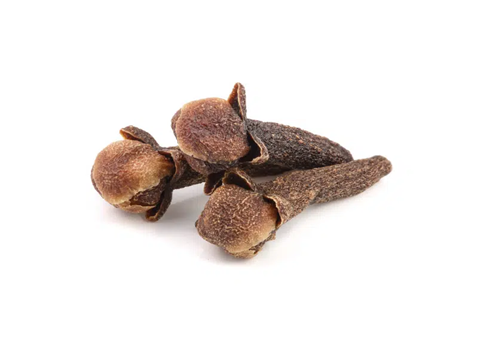This Common Spice Comes with a Few Surprises!
How many of you out there like cloves? This common spice typically reminds us of the holidays, right? Which is too bad, because they have so much more to offer than just a zing to eggnog or pumpkin pie.

From fighting inflammation to boosting digestion, this common spice has many unexpected health benefits. In a nutshell, they’re antiseptic, antifungal, anti-parasitic, pain-relieving, and pack a powerful antioxidant punch and are high in manganese, magnesium, potassium, vitamin K, calcium, and beta-carotene.
Herbalists and spice-sellers advise we keep whole cloves on hand rather than ground or powdered spice, which loses its potency much quicker.
Besides being health-protectors, cloves are good for other things. For instance, consider these unique ways to use them:

✓ Avoid off-putting odors from the vacuum by adding some whole cloves to the bag or cannister. Notice the pleasant and fresh fragrance next time you vacuum.
✓ Infuse your apple cider vinegar with cloves. This takes about 3 to 4 weeks. Once strained, this vinegar is an incredibly potent medicine—good for cooking or to add to the bath for sore muscles.
✓ Steep cloves with white vinegar and orange and lemon peels to create an effective cleaner. Besides an amazing smell, it provides antibacterial and anti-fungal properties to the vinegar.
✓ Make a sore-muscle medicine by gently warming whole cloves and olive oil (over low heat).
✓ Upgrade your next cup of tea in a BIG way by adding whole cloves to the cup. Steep for 5 to 10 minutes and enjoy all the medicinal, health-boosting benefits listed above.
✓ Freshen breath or manage oral pain by chewing a clove for a few minutes (clove essential oil is also used for this purpose). The pain relief is almost instant!

And then, of course, we bake with them. There’s the proverbial pumpkin pie, gingerbread, and spice cake. And folks include cloves when glazing ham. But here’s another use that’s a bit unique. I found this recipe on www.foodandwine.com that features cloves and a couple other spices as a flavoring for beets. See what you think:

3 pounds medium-sized beets
Kosher salt
1 1/2 cups apple cider vinegar
1 1/2 cups sugar
3 bay leaves
1 2-inch cinnamon stick
2 teaspoons whole allspice berries
2 teaspoons black peppercorns
3/4 teaspoon whole cloves
Directions:
Add Recipe to Cook'n

From fighting inflammation to boosting digestion, this common spice has many unexpected health benefits. In a nutshell, they’re antiseptic, antifungal, anti-parasitic, pain-relieving, and pack a powerful antioxidant punch and are high in manganese, magnesium, potassium, vitamin K, calcium, and beta-carotene.
Herbalists and spice-sellers advise we keep whole cloves on hand rather than ground or powdered spice, which loses its potency much quicker.
Besides being health-protectors, cloves are good for other things. For instance, consider these unique ways to use them:

✓ Avoid off-putting odors from the vacuum by adding some whole cloves to the bag or cannister. Notice the pleasant and fresh fragrance next time you vacuum.
✓ Infuse your apple cider vinegar with cloves. This takes about 3 to 4 weeks. Once strained, this vinegar is an incredibly potent medicine—good for cooking or to add to the bath for sore muscles.
✓ Steep cloves with white vinegar and orange and lemon peels to create an effective cleaner. Besides an amazing smell, it provides antibacterial and anti-fungal properties to the vinegar.
✓ Make a sore-muscle medicine by gently warming whole cloves and olive oil (over low heat).
✓ Upgrade your next cup of tea in a BIG way by adding whole cloves to the cup. Steep for 5 to 10 minutes and enjoy all the medicinal, health-boosting benefits listed above.
✓ Freshen breath or manage oral pain by chewing a clove for a few minutes (clove essential oil is also used for this purpose). The pain relief is almost instant!

And then, of course, we bake with them. There’s the proverbial pumpkin pie, gingerbread, and spice cake. And folks include cloves when glazing ham. But here’s another use that’s a bit unique. I found this recipe on www.foodandwine.com that features cloves and a couple other spices as a flavoring for beets. See what you think:
Spiced Pickled Beets

Ingredients:
3 pounds medium-sized beets
Kosher salt
1 1/2 cups apple cider vinegar
1 1/2 cups sugar
3 bay leaves
1 2-inch cinnamon stick
2 teaspoons whole allspice berries
2 teaspoons black peppercorns
3/4 teaspoon whole cloves
Directions:
Preheat the oven to 375°. Put the beets in a large baking dish. Add 1 cup of water and a generous pinch of salt. Cover tightly with foil and bake for about 1 hour, until the beets are tender. Uncover and let cool. Peel the beets and cut them into 3/4-inch wedges. Transfer to a large heatproof bowl.
In a medium saucepan, combine 1 1/2 cups of water with the vinegar, sugar, bay leaves, cinnamon stick, allspice, peppercorns, cloves and 2 teaspoons of salt. Bring to a boil over high heat, then simmer over moderately low heat until reduced to 3 cups, about 12 minutes. Pour the liquid over the beets and let cool; refrigerate overnight. Drain the following day, before serving.
MAKE AHEAD: The drained pickled beets can be refrigerated for up to 5 days.
In a medium saucepan, combine 1 1/2 cups of water with the vinegar, sugar, bay leaves, cinnamon stick, allspice, peppercorns, cloves and 2 teaspoons of salt. Bring to a boil over high heat, then simmer over moderately low heat until reduced to 3 cups, about 12 minutes. Pour the liquid over the beets and let cool; refrigerate overnight. Drain the following day, before serving.
MAKE AHEAD: The drained pickled beets can be refrigerated for up to 5 days.
Recipe formatted with the Cook'n Recipe Software from DVO Enterprises.
 Alice Osborne
Alice Osborne
Weekly Newsletter Contributor since 2006
Email the author! alice@dvo.com
